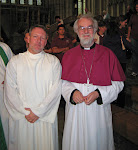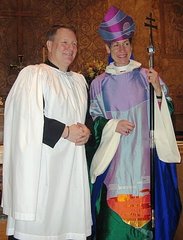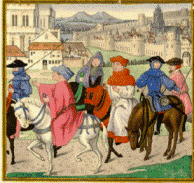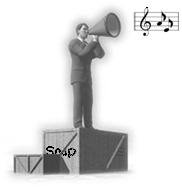Preached on Sunday October 15, 2006 at St. James Fordham Manor, The Bronx, NY: http://stjamesf.dioceseny.org/
Lectionary readings this sermon is based on are found at: http://www.io.com/~kellywp/YearB/Pentecost/BProp23.html
Opening Prayer: Jesus looked at them and said, "For mortals it is impossible, but not for God; for God all things are possible." In the name of the One God: Creator, Redeemer and Sustainer, AMEN.
I haven’t gotten to know most of you yet, and here I am about to preach to you. That feels a little odd to me. I feel like the fellow who showed up at the front door for a first date, and is already asking for the good-night kiss before we even get off the porch!
By way of introduction, let me tell you a bit about how I come to be here at St. James. As Fr. Tobias told you, I’m in seminary now, in my second year there. We don’t just take classes at seminary, we work for two years in what we call our “field” parish, preaching, teaching and, well, doing whatever Fr. Tobias tells me to do with a happy heart! I’m from the Diocese of New York -- my sponsoring parish is the Church of the Ascension, on Fifth Avenue and 10th Street in the Village -- and the folks at the diocese told me that I should try to venture a bit farther afield in looking for a field parish. So, I paid a few visits to parishes in upper Manhattan and the Bronx.
One of my friends tells me that when I put on a coat and tie, with my blond hair and blue eyes and my Southern accent that slips out sometimes, I look like some kind of Morman Missionary come to call. So in some of the Episcopal parishes uptown, with mostly Black folks or Latino folks in the congregation, I got a few “Well, who are you white fellow -- and just what are you doing here?” kind of looks. But not at St. James. I came to St. James and didn’t have but one foot in the door when I ran into Ms. Best. Ms. Best didn’t give me a ‘who are you’ kind of look at all. She came right out and said it: “Well, who are you???” I said, “I’m Mark, who are you?” She smiled at me from under her hat brim and said, “Well, welcome to St. James! I’m Ms. Best!” That felt so good, I have to tell you. I felt like I was noticed and acknowledged and that I was welcome here. I knew I wouldn’t be overlooked at St. James, that ya’ll would see me, speak to me and tell me what you thought of me. And I hope that proves to be true. I hope today you’ll let me know what you think of my sermon, what you liked about it. And if there are parts of it you don’t like, I hope you’ll take those comments right to Ms. Best, since she’s a big part of why I’m here to preach to you in the first place.
I wonder if we could do a bit of a show of hands here. This might seem a little strange, but just go with me for a moment. How many of us have more than one pair of shoes, please raise your hands. Ok, that’s most of us, me included… Now, one more time. Ladies, when you get ready to cook dinner tonight, how may of you will have a choice of what to cook? Raise your hand if, when you get home this evening, you could choose between chicken or maybe fish, or to send out for pizza? If we said yes to these two questions, well, I hate to tell you this but… we’re rich, relatively speaking. If we own more than one pair of shoes and if we have a choice in what we’re going to have for dinner tonight, we’re richer than 85% of the people who have ever lived! Not just now, but ever!
So what does rich really mean? At seminary they teach us to look at what the Bible says in terms of the time and the place in which it was written. Rich meant something different in Jesus’ day. The economy in ancient Palestine was much like the economy of some of the villages I visited a few years ago in Sierra Leone that were just recovering from the civil war in that country. These places have what economists call a ‘limited goods’ economy. There’s hardly any extra to go around -- and that means that if someone is rich, in money or cattle or crops, then someone else is going without. If someone has more than they really need, then someone else is doing without what they need.
We get a little glimpse of this in today’s Old Testament reading from Amos. Amos was a prophet in Israel in the 8th century BC and in his day, Israel was enjoying a period of prosperity. And just like always, ‘prosperity’ meant that the rich were getting richer and the poor were getting poorer. Amos tells the people that “because (they have) trampled on the poor and (taken) from them” to get rich, they’ll won’t ultimately enjoy any of the riches that they’ve accumulated.
I wonder if the rich man in today’s gospel is going to get much enjoyment out of his riches. At the end of today’s reading, he seems pretty sad. The Bible says he goes away shocked and grieving. And I’ll bet that, like the disciples, he is a bit confused. Here again, if we look at things as they were in Jesus’ day, we get a bit of a different perspective from our own. The disciples are ‘perplexed’ by what Jesus says because in that world at that time, being rich meant that you were able to do all the required religious duties. You could pay your temple tax, you could afford to buy doves and lambs to sacrifice at the altar of the Temple in Jerusalem, at the appointed times as the law said you were supposed to. And surely, as folks thought then and sometimes now, if you were rich that meant you were in God’s favor, didn’t it?
Well, I don’t think that being wealthy means that you enjoy any more of God’s favor than do the poor. And I don’t think the rich man in today’s Gospel thinks so either. Why else would he kneel before Jesus and ask what he should do to achieve eternal life? I suspect the rich man senses that, for all his wealth, he lacks something that only God can give. And I suspect that Jesus senses this too. Jesus knows that the rich man has kept the law and wants to serve God, and, as the Scripture says “Jesus, looking at him, loved him.” That’s why Jesus issues the invitation to the rich man to sell everything and follow him. It may sound like a challenge, and a very hard one. But in truth, it is an invitation. Jesus offers the same invitation to the rich man that he offered to the 12 disciples. Stop what you’re doing, give up everything: your job, you home, your family, and follow me.
But this invitation is one that saddens the rich man instead of making him joyful. He loves God, but he loves his many possessions too. And he does not want to choose one for the other. The rich man’s problem is not that he is rich; it is that he loves being rich too much. And when Jesus offers him the opportunity of a lifetime, he cannot see what he might gain, for mourning what he might lose.
I’ve never been rich, but I can identify with the rich man in today’s parable. It’s not easy to give up something that you love, even when you know God has other, better plans for you. It wasn’t easy giving up my job and my income to go to seminary. I had finally gotten to a place in my career where I was earning a pretty good salary. I was not the big boss at my job, but I was the medium boss and I liked that. I enjoyed being in charge of some things at work. I liked the prestige that came with my job for sure, but most of all, I liked the comfortability. I love being in familiar surroundings with people I know and love and respect, and who know and love and respect me. I wouldn’t mind having my favorite meal for supper every night and I like sleeping in my own bed. I don’t like change too much and I don’t like being away from the people and places that make me feel most comfortable, most at home.
I think that’s what the rich man is like too. Jesus is calling him to a new way of life, and all he can think about is how much he’ll have to give up to answer that call. The scripture tells us that the rich man is saddened by what Jesus tells him. And I’m saddened for him too. Because I know that in choosing what he has over what Jesus is offering him, the rich man has cheated himself. He’s gotten the short end of the stick. He’s sold himself short a thousand times over. Because what God offers us is worth so much more than we can ever hope to earn for ourselves. God offers us salvation and eternal life. God offers us treasure in heaven that will outshine all the riches of the earth. God offers us love -- eternal and unconditional -- God will never leave us orphans. How sad is it when someone chooses what they love in this world, and foregoes all that God may have in store for them in this life and in the next…
It takes me a while to get used to new things and new people. I can be shy sometimes, but eventually I make my way in new situations. Seminary was pretty scary to me when I started there a year or so ago. But now, I love it. I think I might be happier now that at any other time in my life. And I know that I live and study among some of the finest people I’ve ever met. It’s a lot of hard work and it can be pretty stressful at exam time. But I know I’m where I’m supposed to be… I hope that in the coming weeks and months, I’ll find my way here at St. James too.
Discerning God’s will is not easy. It’s not always straightforward. Most folks would have thought the rich man in today’s gospel had it pretty good. But he knew he lacked something, and when Jesus told him what it was, he didn’t welcome the news. I know how that feels and, I expect that some of you do too. Sometimes God calls us away from all that we know and cherish, to a new way of life and to a new challenge. It’s not often an easy call to hear or to accept. But what God has in store for us is worth so much more than we can ask or imagine. And with faith, we can answer the call, and let go of what we love too much, and accept the greater love that God offers to us all. It may be a challenge, it may even seem impossible, but not for God… for God, all things are possible.
AMEN.
© 2006 by Mark Robin Collins







No comments:
Post a Comment